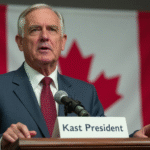Background on Key Figures and Context
Claudia Sheinbaum, the Chief Executive of Mexico City and a prominent figure in Mexican politics, has advocated for electoral reform. As part of this proposed reform, she aims to decrease the number of legislators and limit public funding for elections and political parties. Guadalupe Taddei Zavala, the President of Mexico’s National Electoral Institute (INE), emphasizes the importance of maintaining an autonomous electoral body with proven technical capacity, separate from political influences.
The Role of INE and its Challenges
Taddei Zavala highlighted that the current challenge for Mexico’s electoral system is adapting to new political contexts without altering its foundations. She acknowledged that any electoral reform would be a complex political process rather than just a legislative act. Taddei Zavala urged addressing the structural and emerging challenges faced by the INE, warning that failure to do so could lead to unforeseen consequences.
INE’s Future and Electoral Reforms
Taddei Zavala stressed the need for a 21st-century INE that is autonomous, technically proficient, citizen-focused, and transparent. She emphasized that the INE must remain separate from political upheavals and actively listen to citizens’ demands. She also insisted that upcoming reforms should correct past shortcomings and anticipate emerging issues.
Additional Perspectives on Electoral Reform
Lorenzo Córdova Vianello, former INE President and current UNAM researcher, noted that electoral reform has been part of the government’s agenda for years. He acknowledged this as legitimate but unprecedented in Mexico’s history, given the proposed reinvention of the electoral system.
Miguel Armando López Leyva, Coordinator of Humanities at UNAM, referred to the Presidential Commission for Electoral Reform. He pointed out that the commission’s primary argument is Mexico’s political change and issues of trust in political parties. López Leyva stressed the importance of ensuring clean, free, and fair elections with equal competition conditions.
Ex-Judicial Employees Demand Payment
Former employees from the Federal Judicial Power (PJF) across Mexico’s 32 states protested at the Organismo Administrativo de Justicia (OAJ) headquarters in Mexico City, demanding payment of severance packages.
Elva Sánchez, a retired Circuit Magistrate, reported that around 800 former judges who resigned from contesting the June 1 judicial elections to maintain their positions, most with 20 years of service and 30 years of tenure, have not received their constitutionally-mandated three months’ salary and 20 days of service pay.
Sánchez warned that peaceful protests “will have to escalate” if they do not receive their payments within a reasonable timeframe.
Key Questions and Answers
- What is the main focus of Claudia Sheinbaum’s electoral reform proposal? Sheinbaum aims to reduce the number of legislators and limit public funding for elections and political parties.
- What challenges does Guadalupe Taddei Zavala highlight for Mexico’s electoral system? Taddei Zavala emphasizes the need for an autonomous electoral body with proven technical capacity, separate from political influences.
- What does Lorenzo Córdova Vianello say about electoral reform in Mexico? Córdova Vianello acknowledges electoral reform as part of the government’s agenda, emphasizing Mexico’s political change and issues of trust in political parties.
- What demands are ex-judicial employees making? Former PJF employees are protesting for payment of severance packages as mandated by the constitution.






